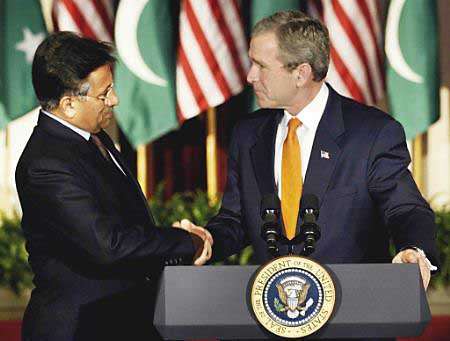Yesterday, President Bush spoke publicly for the first time about General Musharraf’s coup d’état in Pakistan. His remarks and his conduct overall make for a curious contrast with his recent reaction against the Burmese dictatorship and its crackdown against demonstrations that sprang out of the nation’s faith-based community. His words directed towards Musharraf were astonishingly mild and understanding.
Musharraf’s coup was a strike first against the Rule of Law. The enemy he identified consisted of the judges, the courts, and the legal profession. He claimed they were taking the country down.
Musharraf’s moves were crafted to echo Bush’s own rhetoric: his denigration of lawyers, courts and judges, and his steady erosion of constitutional rights in order to bolster his own war-making powers. If Bush can play this game, Musharraf thought, why can’t I? But apart from his religious salutations, Musharraf’s speech could almost have been given by Dick Cheney at his next visit to a Whites-only country club. Musharraf’s main speech even evoked Abraham Lincoln in language that could have been taken straight from the pages of the Weekly Standard. They hit their target.

Developments in Pakistan since Saturday warrant close attention. I am not a Pakistan expert, though I track the affairs of Central Asia very closely, and Pakistan is a vital peripheral power to my zone of concentration. Moreover, those who are deep into counterterrorism studies know that no country in the world is nearly so much a subject of concern as Pakistan. Let’s rehearse the key facts.
-
We don’t have to fret over whether Pakistan has a nuclear arsenal and delivery system. There’s no doubt about it. It does. And it’s been the world’s most tireless agent of nuclear proliferation for twenty years.
-
Every few months, the handful of Americans who do not suffer from Attention Deficit Disorder ask: Where is Osama bin Laden, and why has he not been brought to justice? And the answer is: he is lounging comfortably in Pakistan, or somewhere very close to the Pakistani frontier in Afghanistan, surrounded by friends and admirers.
-
Where have the Taliban been permitted to regroup, draw fresh recruits and launch attacks on NATO troops, including young Americans, in Afghanistan? In Pakistan, of course. Indeed, the Taliban is often seen as the brainchild of some key players in Pakistan’s military intelligence, the ISI, who continue to this day to maintain close relations with it.
-
Where has Al Qaeda itself been permitted safe harbor, been given facilities to conduct its operations, communicate with its various arms, raise fresh recruits, and plot its strategies of terror and mayhem? In Pakistan, of course.
Pakistan, not Iraq and not Afghanistan, was the key battleground of the war on terror on 9/11 and it has never ceased to hold that position. Yet the U.S. Government never really gave Pakistan the attention it needed. If you had to struggle for one word to describe the official U.S. engagement with Pakistan, no doubt it would be “ignorant.” As in: fundamentally uniformed. As Pakistan becomes a greater and greater risk, there is no point in which U.S. policy towards the world’s only Islamic nuclear power, and the center of a global nuclear proliferation problem, has been so poorly informed. Indeed, the Pakistan relationship continues to be described by key foreign policy strategists in terms of medieval feudalism. General Musharraf is seen as a “friend,” and the continuance of a personal relationship with Musharraf is seen as the substance of the relationship.
As I outlined earlier, however, Condoleezza Rice pushed a new policy for the U.S. on Pakistan—it focused on working to create a government with a broader and potentially more stable basis. Condi Rice’s concept, which actually seems to have first come out of Whitehall, was to arrange a shotgun wedding between Musharraf and Bhutto. And Bhutto, sensing she had the upper hand with Pakistan’s key Atlantic allies, drove a very hard bargain. Whatever defects one sees in Bhutto and her Pakistan People’s Party–and they are severe–this plan offered a lifejacket to a floundering Pakistani state. And for the first time in recent memory, American policy was focused on Pakistan, and not the persona of the current dictator in charge.
So what went wrong? In my view, Musharraf sensed a fault line in the U.S. between Condoleezza Rice, the author of the arrangement with Bhutto which he found so unappetizing, and his “friend” Dick Cheney. Musharraf gambled that in the end, Cheney and not Rice would be the advisor to whom Bush would turn. And Musharraf was spot on.
For those interested in tracking what’s going on in Pakistan today, my advice would be not to waste too much time reading the newspaper accounts. They cover the major facts, but their analysis is pretty tepid. The best work on the analytical side consistently came from Barney Rubin, whose live-blogging from Islamabad was an essential tool for the better journalists covering the story. (Disclosure: as those of you who have read Rubin’s pieces will know, I am an occasional conspirator with him—particularly in working out the very complex legal tangles that have driven many of Musharraf’s moves.)
The developments in Pakistan are extremely dangerous. And the posture adopted by Bush points to the usual triumph of dumbed-down cronyism over intelligent analysis. It reflects Bush’s vision for himself and the world, namely, no vision at all.



